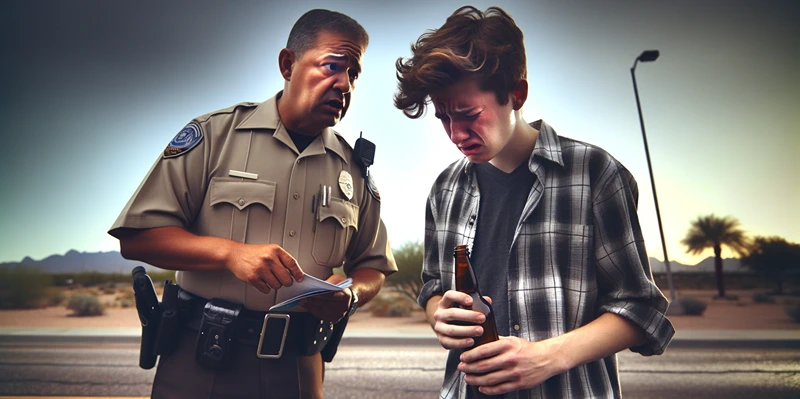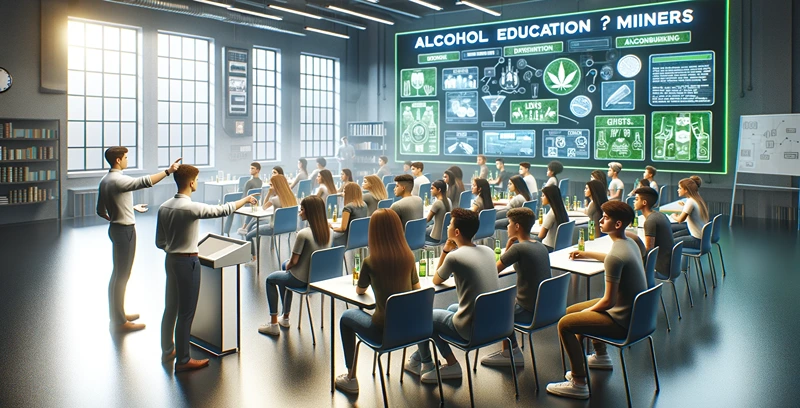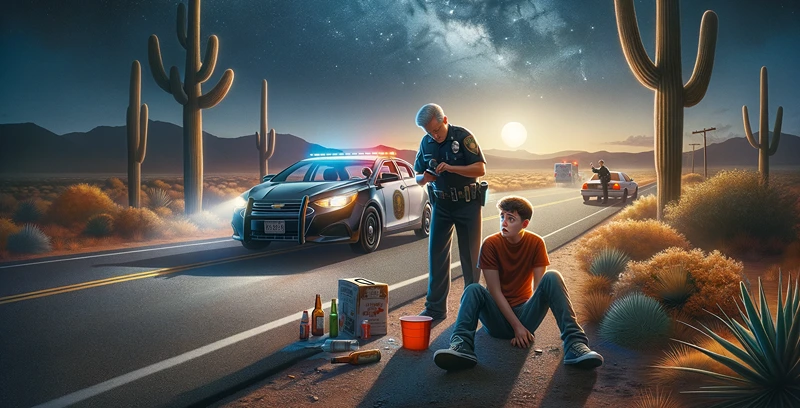Defending Against a Minor in Possession Charge: Arizona Law

This article discusses the following:
Being charged with a minor in possession of alcohol in Arizona can have serious consequences. In the state, it is illegal for anyone under the age of 21 years to possess or consume alcohol, and a conviction for this offense can result in a misdemeanor on your record.
If you find yourself facing such charges, it is important to seek the help of a skilled criminal defense lawyer who can help you understand the legal system.
At Kolsrud Law Offices, our team is dedicated to providing the best possible defense for individuals facing minor in possession charges. Our experienced criminal defense lawyers have a track record of success in getting these charges reduced or dismissed for our clients. If you are facing a minor in possession charge in Arizona, don't hesitate to contact us to schedule a free consultation and start building your defense today.
Contact us today to schedule a
FREE CONSULTATION and learn
how we can help you.
What is a Minor in Possession Charge
A Minor in Possession (MIP) charge in Arizona is a legal offense that applies to individuals under the age of 21 who are found in possession of alcoholic beverages. The specific statutes governing this charge can be found under Arizona Revised Statutes (ARS) §4-244(9), which makes it unlawful for anyone under the legal drinking age to buy, receive, have in one's possession, or consume alcohol.
This law is designed to discourage underage drinking and uphold public safety standards. It's important to note that the term "possession" is broadly interpreted under state law. It doesn't only refer to physically holding an alcoholic drink but can also apply in situations where a minor has control over the location where alcohol is found (such as in a car or at a personal residence).
Examples of When These Charges Arise:
- Direct Possession: The most straightforward example is when a minor is caught holding an alcoholic beverage, whether it’s opened or unopened. This could occur at parties, during traffic stops, or in public spaces.
- Constructive Possession: This occurs when alcohol is found in a place over which the minor has control, such as in their vehicle, backpack, or room. Even if the minor is not directly holding the alcohol, they can be charged if it is determined they had knowledge of and access to the alcohol.
- Consumption: If a minor is found to have consumed alcohol, evidenced by a breathalyzer test or visible intoxication, they can be charged with MIP, even if they are not currently in possession of alcohol.
- Purchase Attempt: Attempting to purchase alcohol or asking someone else to purchase it for them can also lead to MIP charges for a minor. This includes situations where a minor uses a fake ID to try to buy alcohol.
- Receiving Alcohol: If a minor is given alcohol by someone else, they can be charged with MIP, regardless of whether they solicited the alcohol or it was given unsolicited.

What are the Penalties?
The consequences of an MIP conviction can vary depending on the circumstances of the case, including the individual's age, prior offenses, and the specifics of the incident. Under Arizona law, particularly Arizona Revised Statutes (ARS) §4-244, penalties can range from fines to community service, and in some cases, incarceration.
Penalties for Minor in Possession Charges can include:
- Fines: One of the most common penalties for an MIP offense is a monetary fine. The exact amount can vary based on the specifics of the case but can be a significant financial burden for young individuals.
- Community Service: Courts often impose community service requirements on minors convicted of possession charges. The hours required can vary, providing a means for the individual to give back to the community while reflecting on their actions.
- Alcohol Education Programs: Minors may be required to attend and successfully complete an alcohol education or counseling program. These programs are designed to educate young individuals about the risks and legal implications of underage drinking.
- Probation: In some cases, a minor might be placed on probation instead of serving time in jail. Probation conditions can include regular check-ins with a probation officer, maintaining good grades (if the individual is a student), and avoiding legal trouble.
- Incarceration: While less common for first-time offenders, incarceration is a possibility, especially for repeat offenders or if the MIP charge is combined with other serious offenses such as driving under the influence (DUI) or possession of a fake ID.
- Driver's License Suspension: Arizona law allows for the suspension of driving privileges for minors convicted of an MIP charge. The duration of the suspension can vary, significantly impacting the individual’s mobility and independence.
- Record Impact: An MIP conviction can remain on a minor's record, affecting future employment opportunities, college admissions, and scholarship eligibility. While not a direct penalty, the long-term impact on a young person's future can be significant.
It is important for minors and their guardians to understand the potential penalties associated with an MIP charge in Arizona. The severity of the consequences typically depends on the specifics of each case, including any prior related offenses and the circumstances of the current charge.
How Long Does an MIP Stay on Your Record in Arizona?
In Arizona, a Minor in Possession (MIP) charge generally remains on an individual's record but can be addressed through legal avenues.
Individuals may apply for a set-aside under Arizona Revised Statutes (ARS) §13-905, which vacates the judgment and dismisses the charges, though it does not erase the conviction.
This action can improve the record's appearance for background checks, though Arizona does not offer full expungement for adult records.
Juvenile records have more options for sealing or expungement, depending on specific conditions such as the completion of sentence terms and subsequent behavior.

Caught with a Fake ID at Your Local College Bar
John, a 20-year-old college student, decides to go out with friends to a bar known for its strict age verification policies. To bypass these policies, John uses a fake ID that claims he is 25. At the bar, John successfully purchases and consumes alcohol. However, a routine check by law enforcement later in the evening leads to John being questioned. The officers discover his actual age and the fake ID he used to procure the alcohol.
➤Legal Implications:
- Possession of a Fake ID: Under Arizona law, specifically ARS §13-2002, John's act of knowingly possessing and using a forged instrument (the fake ID) to deceive and commit an unlawful act (purchasing alcohol underage) constitutes forgery, which is generally treated as a felony. The severity of the charge can depend on the circumstances, but the mere act of using a fake ID for such purposes exposes John to significant legal penalties.
- Minor in Possession (MIP): In addition to the fake ID charge, John can also be charged with MIP under ARS §4-244(9), as he is under 21 and was found consuming alcohol. This charge addresses the fact that regardless of the fake ID, John is still legally considered a minor and is therefore prohibited from purchasing and consuming alcohol.
In this scenario, John faces the possibility of being charged with both possession of a fake ID and MIP. Each charge carries its own set of penalties. For the fake ID, John could face felony charges, leading to potential jail time, fines, and a criminal record that could impact his future employment, education, and other opportunities. For the MIP, he could face additional fines, mandatory alcohol education classes, community service, and possibly even suspension of his driver's license.

DUI and a Minor In Possession Charge
In Arizona, a DUI charge is pursued when an individual operates a vehicle under the influence of alcohol or drugs. For minors, the state enforces a "zero tolerance" policy, meaning that any detectable amount of alcohol in their system while driving can lead to a DUI charge, as outlined under Arizona Revised Statutes (ARS) §4-244(34). This is stricter than the laws for individuals over the age of 21.
Additionally, if a minor is found to have alcohol in their possession inside the vehicle, they can also be charged with an MIP, pursuant to ARS §4-244(9). This compounds the legal challenges they face, as they must now defend against both the DUI and MIP charges.
The penalties for a combined DUI and MIP charge can include heavy fines, suspension of driving privileges, mandatory alcohol education classes, community service, and potentially incarceration, especially if it's not the individual's first offense.
Defenses to a Minor in Possession Charge
When facing a Minor in Possession (MIP) charge in Arizona, there are several defenses that can be employed to challenge the accusation. The effectiveness of each defense will depend on the specific circumstances of the case.
Lack of Actual Possession
One defense is arguing that the minor did not actually have physical control over the alcohol. If the alcohol was found in a location where multiple people had access, it might be possible to argue that the minor neither owned nor had control over the substance.
No Knowledge
If the minor can prove they were unaware of the presence of alcohol, this defense might be applicable. This situation could arise if alcohol was hidden in a vehicle or personal belongings without their knowledge.
Religious or Medical Reasons
Arizona law allows for certain exceptions to the MIP charge, such as the consumption of alcohol for religious purposes or under a doctor’s prescription. If applicable, this defense must be supported with credible evidence.
Temporary Possession
- This defense argues that the minor held the alcohol only temporarily and for a legitimate purpose, such as removing it from a public area or disposing of it. However, this defense requires clear evidence that the possession was indeed temporary and not for the purpose of consumption.
Involuntary Intoxication
Although rare, if a minor can prove they were involuntarily intoxicated – for example, if they were unknowingly given alcohol – this could serve as a defense.
Constitutional Violations
If the evidence was obtained through an illegal search and seizure, violating the Fourth Amendment rights, it might be possible to get the evidence dismissed, which could lead to the dismissal of the charge.
Entrapment
This defense applies if the minor was induced by law enforcement to break the law in ways they would not have otherwise. This is a complex defense and requires substantial evidence to prove.
An experienced attorney can assess the situation, gather necessary evidence, and articulate a defense strategy aimed at reducing or dismissing the charges. Remember, every case is unique, and the success of a defense depends on the individual circumstances surrounding the MIP charge.
Free Consultation With An Arizona Defense Attorney
Facing legal challenges like Minor in Possession (MIP) or possession of a fake ID can be overwhelming. Kolsrud Law Offices offers a free initial consultation to discuss these issues. Our experienced defense attorneys will review your case, provide answers, and outline potential legal strategies.
Contact us today at 602) 638-3790. to begin addressing your legal concerns with experienced professionals dedicated to your defense and legal well-being.
An award-winning criminal defense attorney Since 2006
Why Choose Josh Kolsrud
With over 100 trials to his name, and years of experience as a state and federal prosecutor, Josh understands the law, the legal process, and your rights. Josh is also committed to representing every client with utmost integrity and dedication
Experience
Josh has prosecuted major crimes on the state and federal level, led a successful anti-human sex trafficking operation that saved lives, and argued before countless juries and justices for his clients
Expertise
Josh is an expert in both Arizona and federal criminal law, and is ready to put that expertise to work for you.
Dedication
As a prosecutor, Josh saw far too many defendants lose their livelihood due to poor representation. Josh will always give every client his complete attention and effort
Get a Free Initial Consultation:
Complete our form below to get a free case review.
or call us at (480) 999-9444.
